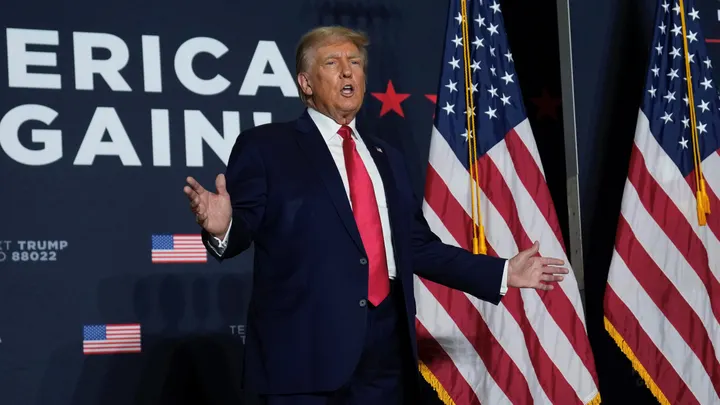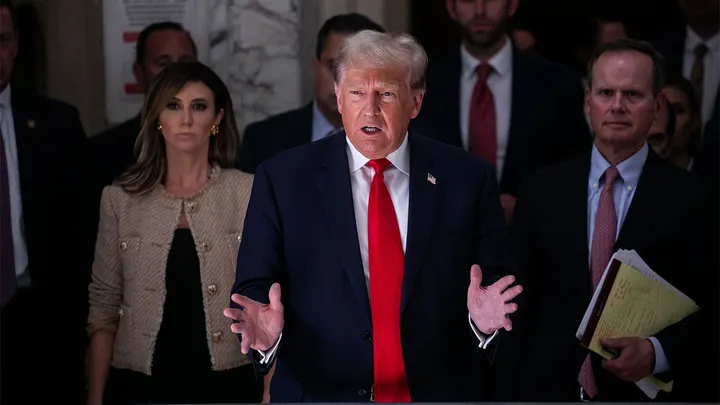Haley has jumped to 16% in the new Des Moines Register survey, tying her with DeSantis
Nikki Haley’s favorable media coverage is increasing and so is her popularity in the polls.
Several reports have already highlighted a “Haley’s moment,” and the latest highly-respected poll in Iowa has fueled the fire. According to the latest Des Moines Register survey, former U.N. Ambassador support increased to 16%, a significant increase from the previous 6%. That puts her on par with Florida Gov. Ron DeSantis, who has seen a three-point decline in potential caucus-goers and faced premature speculation about his political future.

Haley’s campaign was well executed and she performed brilliantly in the debates. Her extensive international experience has drawn more attention, especially as the ongoing Israel-Hamas conflict dominates the headlines. Part of her increased support in Iowa can be attributed to independent and suburban voters.
“Haley is making significant progress at a crucial time,” noted veteran GOP strategist Mike Murphy in a Politico article published the day before the poll’s release. He compared the earlier media attention to baseball teams’ preseason coverage during summer training and suggested that the real competition was just beginning.
However, the shadow of Donald Trump still looms large over the campaign. A Register/NBC poll shows the former president maintaining a substantial lead with 43% support.
In response, anti-Trump Republicans are pushing aside other Republican candidates and rallying behind Haley, especially following Mike Pence’s decision to drop out of the race. However, it is unlikely that all the other candidates will follow suit and support Haley.
Trailing the field is Tim Scott, who says it’s Iowa or bust, at 7%, and Chris Christie and Vivek Ramaswamy, both at 4%.

Trump’s opponents are excited about one statistic: 37% of his voters say they are keeping their options open ahead of the January caucuses. That means they can change, but removing them is harder than it sounds.
In fact, it’s worth noting that 47% of Trump supporters express strong enthusiasm for their candidate, more than double their enthusiasm for Nikki Haley, and almost twice as devoted to Ron DeSantis.
However, DeSantis has a silver lining in these findings. About 27% of respondents named him as their second choice, and an additional 25% were actively considering him. This suggests that DeSantis has appeal beyond his core supporters.
The outcome of the chilly January night caucuses will depend on who ultimately votes, but Nikki Haley appears to be a more competitive candidate in the race for second place than Donald Trump dominates.
Caution is warranted when interpreting poll results, as past candidates have experienced significant surges in Iowa in the final weeks leading up to the caucuses. Notably, Ted Cruz, Rick Santorum, and Mike Huckabee all managed to win caucuses after fending off a crowded field. However, it should be noted that these successes did not necessarily translate into success in wider campaigns.
Additionally, complex rules and the implications of caucuses, which include the importance of being a second choice for voters, make predicting outcomes challenging.
At the recent Republican Jewish Conference, Nikki Haley criticized former President Trump, describing his comments about Hezbollah as “confused” and pointing to his past praise for the leaders of China and North Korea. Along with the Iranian Ayatollah, she argues, these leaders are among the world’s most vicious dictators.
Ron DeSantis may have waited too long to publicly criticize Trump, and an attempt to present himself as a Trump-like candidate without the associated baggage did not resonate with voters. Many Trump supporters prefer an authentic narrative.
In contrast, Nikki Haley is making efforts to build a new and diverse coalition of supporters. Pollster J. Ann Selzer noted that Haley is tapping into various demographic groups, demonstrating her broad appeal as the former South Carolina governor.
While the media is describing Haley’s recent momentum as a “breakout,” it remains to be seen whether she can continue and expand on this success, especially in later primary states. However, she still has a considerable distance to reach Donald Trump’s dominant presence in the race.